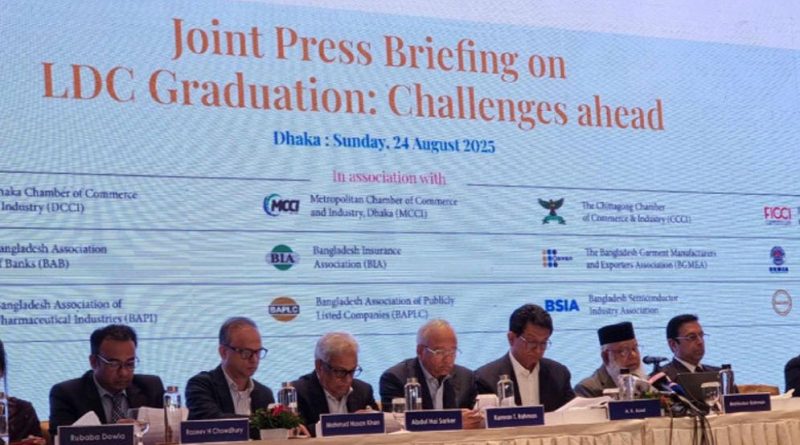Leading business organisations have urged the government to push back Bangladesh’s graduation from the least developed country (LDC) category by three to five years, citing risks to exports, the pharmaceutical industry, and the ready-made garment (RMG) sector.
The call was made at a press conference in Dhaka on Sunday, organised by the International Chamber of Commerce (ICC) Bangladesh under the theme “LDC Graduation: Challenges Ahead”. The Federation of Bangladesh Chambers of Commerce and Industry (FBCCI), Dhaka Chamber of Commerce and Industry (DCCI), Metropolitan Chamber of Commerce and Industry (MCCI), BGMEA, BKMEA and BTMA joined the appeal.
In a written statement, ICC Bangladesh president said entrepreneurs welcome LDC graduation but stressed that additional time is essential to prepare the economy for post-graduation challenges.
Bangladesh is set to graduate from the LDC category in November 2026 after meeting UN thresholds on per capita income, human asset index, and economic vulnerability index in two consecutive reviews. While business leaders acknowledged this as a national milestone, they warned that failure to manage the transition could bring severe economic shocks.
They noted that after 2026, duty-free market access to major destinations such as the EU and UK may be withdrawn, potentially cutting exports by 6–14 percent. Bangladesh will also lose special benefits under the World Trade Organization (WTO), including export subsidies and exemptions under the TRIPS agreement. Moreover, the country will have to rely on market-based loans instead of concessional finance, increasing repayment burdens.
The pharmaceutical and RMG sectors are seen as the most vulnerable. The pharma industry, which currently meets 98 percent of domestic demand and exports to over 150 countries, has thrived under TRIPS waivers. Once those protections end, the cost of lifesaving medicines such as cancer and HIV drugs could skyrocket. For example, the monthly cost of the cancer drug Imatinib could jump from USD 30–40 to USD 2,000–3,000.
Meanwhile, the RMG sector, which accounts for over 81 percent of Bangladesh’s export earnings, is bracing for tougher competition due to the loss of duty-free access, higher production costs, and stricter compliance requirements.






